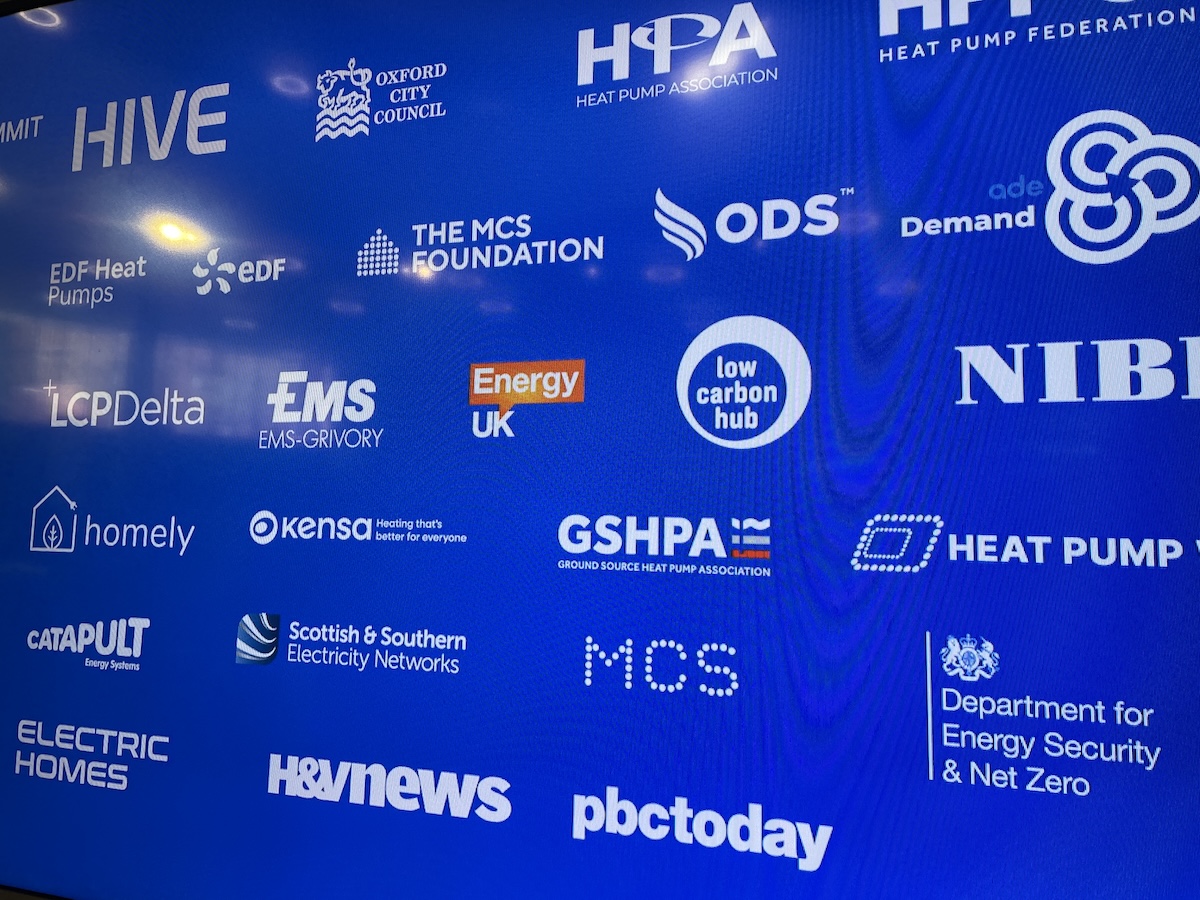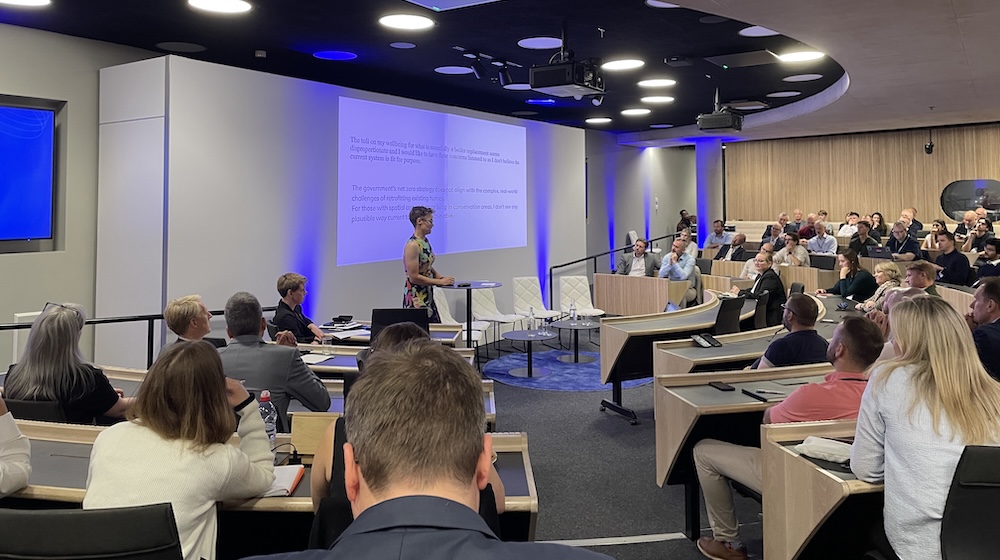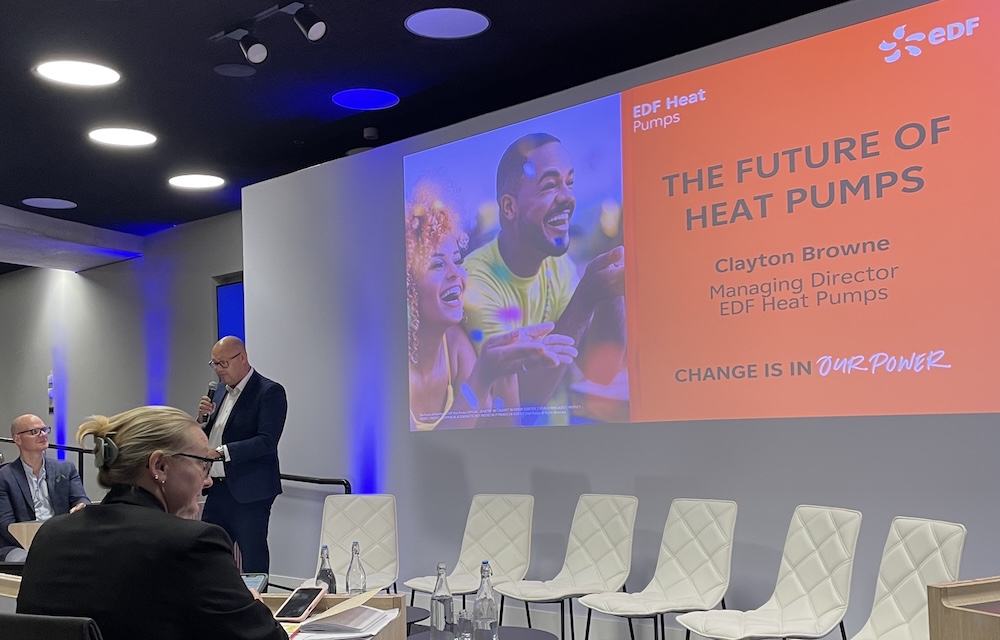
Making heat pumps mainstream
The Low Carbon Hub team was out in force at Heat Pump Summit 2025, with Mairi Brookes, our Smart Energy Systems Director, moderating the morning panels discussions.
As an Official Partner, we were glad to bring an Oxfordshire voice into a national conversation about speeding up clean, affordable heating.
Hosted at the Blavatnik School of Government, University of Oxford, the Summit brought together installers, manufacturers, local authorities, housing providers, network operators and government. The shared question was simple: how do we move heat pumps from early promise to everyday choice?
Below are our takeaways: what worked, what still needs fixing, and what you are likely to notice next.

Where the sector is now
Heat pumps are not a new technology. They are mainstream in much of Europe, especially Norway, Sweden, and Finland. In the UK, they are no longer a novelty, but we are still early in the journey.
On the classic adoption curve, we are moving from innovators – the early experimenters who try new tech first – into early adopters – the practical pioneers who follow once the benefits are clear. Much of Europe is already into the early majority, where heat pumps are normal. That gap explains the rough edges you still hear about here in the UK, from policy detail to installer training and installation practice.
A cautionary tale from Oxford
Cllr Anna Railton, Cabinet Member for Zero Carbon Oxford and Climate Justice, opened the day – and her story neatly echoed the wider discussion.
She told a story about “How not to install a heat pump”. In her example a family were determined to do their bit and install a heat pump. They did their homework, saved up, and kept applying for permission – only to be turned down again and again.

Despite their pushing, the refusals kept coming for a wide range of reasons. As such, no one was acting in bad faith, but rules, risk, and process friction got in the way. The lesson was not about the technology; it was about the system around it. If we want ordinary families to say yes, the system has to say yes more easily.
“The family did everything right – the system didn’t.”
Anna Railton, Oxford City Council
She also raised a fairness question: why do heat pumps installations face extra checks and conditions, while like-for-like gas boiler swaps – or even new wood burners – can proceed with few hurdles? If we want a level playing field, the rules and processes should be consistent, proportionate, and easy to navigate.
What’s already moving
Installations are compounding – 2024 set a record, and 2025 is tracking higher again – and a growing number of those units are now made in the UK. New-build rules are steering developers towards low-carbon heat as standard. It has the feel of early rooftop solar: first a single system on your street, then three, then it simply becomes normal. Heat pumps are at the earlier stage of that pattern, but the direction is clear.
The government’s message was plainer and more to the point this year. In his closing remarks, Dr Matthew Aylott (Department for Energy Security and Net Zero) was crystal clear: closing the price gap between electricity and gas is the top priority. If running a heat pump plainly costs less than a gas boiler, more households will say yes. We expect more detail in the Warm Homes Plan this autumn.
“Top priority: close the electricity-gas price gap.”
Dr Matthew Aylott, Department for Energy Security and Net Zero
What we need to fix to go faster
Price and running costs
The “spark gap” is the simple kitchen-table maths people do. Electricity costs more per unit than gas; a heat pump is roughly three times as efficient as a boiler. When the electricity–gas gap is too wide, the saving looks uncertain and people hesitate. Rebalancing prices means monthly running costs for a heat pump can beat a boiler more clearly. That’s what shifts decisions at home.
The boring but vital grid checks
Around four in five boiler replacements are “distress purchases” after a breakdown. If you discover late in the day that you need a main fuse upgrade (the safety fuse where your home connects to the network), or that your electricity service is looped with a neighbour, a heat-pump plan can stall. Scottish and Southern Electricity Networks (SSEN) is piloting a simple address checker so households can see their likely status early, upload photos, and get any small upgrades booked before they order a heat pump. It is not glamorous, but it removes a common trip-wire and makes clean-heat decisions possible even under time pressure. Planning ahead helps too: if your boiler is elderly, get a survey done now so you are not choosing in a panic.
“Find grid hurdles early, not on install day.”
Richard Hartshorn, Scottish and Southern Electricity Networks (SSEN)

Back the workforce we already trust
We do not have a shortage of heating engineers; we have over 100,000 Gas Safe professionals, many of them trusted by families they have served for years. Our job is to make it straightforward for more of them to add heat pumps to what they do.
Clayton Browne of EDF Heat Pumps put it simply: cut avoidable paperwork, give practical support on design and commissioning, and pay attention to those first few installs, which are always the hardest. One more fact worth noting: nearly half of gas engineers are over 50. Opening an attractive, supported pathway now matters for both today’s workforce and the next generation.
“There are plenty of engineers. What’s missing is a straightforward, supported path from boilers to heat pumps. Fix the admin and design hurdles and the problem goes away!”
Clayton Browne, EDF Heat Pumps
Quality and aftercare as standard
What people experience after installation shapes the story on every street. When systems are sized and designed properly, set to sensible flow temperatures, and handed over clearly, households are warm, bills are predictable, and heat pumps fade into the background – as they should. When those steps are rushed, the technology gets blamed for a process problem.
Manufacturers are expanding assisted commissioning and seven-day support. Smart controls can keep systems tuned, spot issues early, and fix small problems remotely. MCS is strengthening post-installation checks. Treat a heat pump as a service you stand behind, not just a box on a wall, and confidence grows.
“Treat it as a service you stand behind, not just a box on a wall.”
Elizabeth Wilkinson, Product Director (Domestic), Groupe Atlantic.
Voices that stood out
Dr Matthew Aylott set a clear priority: fix the price signal so clean heat wins on running costs. Clayton Browne reminded us that simplicity for installers is simplicity for households, and that the big prize is bringing the engineers people already trust along on the journey. Dr Richard Hauxwell-Baldwin of the MCS Foundation offered the most honest challenge: many people still do not know what to do, why to do it, or who to trust.
The best answer is proof you can see – open homes, coffee mornings, and a chat with someone on your street who already has a heat pump – and it’s exactly the kind of neighbour-to-neighbour approach we at Low Carbon Hub champion.
“Open homes and coffee mornings beat myths – neighbours trust neighbours.”
Richard Hauxwell-Baldwin, MCS Foundation
Looking ahead: what you might actually notice
If price rebalancing lands, grid checks move earlier, installers get better support, and aftercare becomes standard, the changes will be everyday and obvious. Quotes will be easier to compare. The path from “interested” to “installed” will feel more joined-up.
Decisions after a boiler breakdown will be quicker because small network upgrades are sorted in advance. Engineers will be more confident because they are better backed. And you will hear more from neighbours who are warm, comfortable, and happy with their bills.
There is also a wider market reality to keep in mind. Today, there is a small “able-to-pay” segment, and a grant-funded segment in social housing. Between them sits the big majority – people who want to act but are put off by upfront costs, disruption worries, or the louder myths in the media. Clear information, fair finance, and visible local proof are what bring that middle with us.
Final word
The Summit’s theme – “Accelerating the wide-scale deployment of heat pumps” – didn’t feel like wishful thinking. Momentum is building, and we know heat pumps work – just look across Europe.
Now it’s about picking up the pace: sort the price signal, tidy the grid admin, back our installers, and keep quality high. Do that, and the change will show up in everyday ways – warmer homes, lower bills, quieter rooms. We cut carbon, strengthen energy independence alongside renewables, and make clean heat the norm. This is all within reach.
For info about this and future events, see: heatpumpsummit.com
The Blavatnik School of Government in Oxford: bsg.ox.ac.uk
